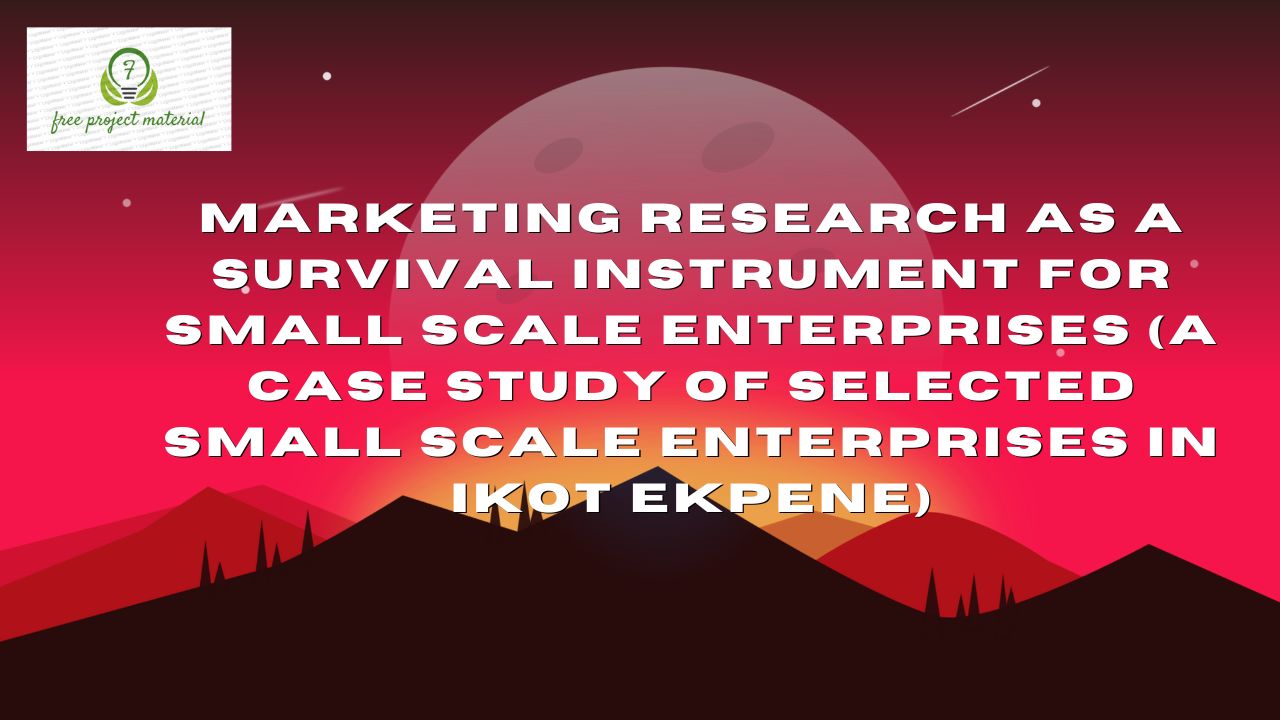ABSTRACT
This study was designed to examine marketing research as a survival instruments for small scale enterprises (a case study of selected small scale enterprises in Ikot Ekpene). To accomplish the objectives of the study, the study adopted the survey research design while the Taro Yamane formula was used to select three hundred and thirty three (333) respondents as the sample size for the study. An instrument of the study was a self-developed questionnaire and the forms were personally. Research questions were formulated to guide the study and data were analyzed using the descriptive statistical tools which involved the use of simple percentages and frequency tables. Based on the data analysis, the finding of the study revealed that customers, suppliers, Economy, Industry and technology as survival instruments impacts on small scale enterprises. It was concluded that, small-scale business can survive if they can embark on sound planning function, marketing function, good cash management and adequate control of business activities. It was recommended that To maintain a sustainable business enterprise in Nigeria, manufacturing SMEs in Nigeria need to adopt and implement marketing orientation that will enhance the continuous growth and survival of enterprises.
LIST OF TABLES
Table 4.1.1 Response to Research Question (1)……. 55
Table 4. 1.2 Responses to Research Question (2). …. 56
Table 4.1.3 Response to Research Question (3)…….. 57
Table 4. 1.4 Responses to Research Question (4)……. 58
TABLE OF CONTENTS
Title page – – – – – – – – – i
Approved page – – – – – – – – ii
Certification – – – – – – – – iii
Dedication – – – – – – – – – iv
Acknowledgement – – – – – – – v
Abstract – – – – – – – – – vi
List of Tables – – – – – – – – vii
Table of Contents – – – – – – – – viii-x
CHAPTER ONE
INTRODUCTION
1.1 Background of the Study – – – – – – 1-3
1.2 Statement of the Problem – – – – – – 3
1.3 Objective of the study – – – – – – 4
1.4 Research Question – – – – – – – 4
1.5 Scope of the Study – – – – – – – 5
1.6 Significance of the Study – – – – – – 5
1.7 Limitations of the Study – – – – – – 5-6
1.8 Organization of the Study – – – – – – 6-7
1.9 Definition of Terms – – – – – – – 7-8
CHAPTER TWO
REVIEW OF RELATED LITERATURE
2.1 Conceptual Framework – – – – – – 9
2.1.1 Marketing Research – – – – – – 9-13
2.1.2 Customer Intensity – – – – – – 13-15
2.1.3 Unpackging the Concept of Market Orientation – – 15-17
2.1.4 Value Creation – – – – – – – 18-20
2.1.5 The Role of SMEs in Nigeria Economy – – – 20-21
2.1.6 Importance of Marketing Function of SMEs – – 21-23
2.1.7 History of Small Business Survival and Demise – – 23-25
2.1.8 Small Business and Business Strategies – – – 25-31
2.1.9 Regulatory Environment of SMEs Marketing in Nigeria – 31-32
2.1.10 Internal Determinant of Firm’s Survival – – – 32-35
2.1.11 Customers as Survival Instrument for
Small Scale Enterprise – – – – – – 35-37
2.1.12 Supplier as Survival Instrument for Small Scale Enterprise- 37-40
2.1.13 Economy as a Survival Instrument for Small Scale Business – 40-41
2.1.14 Industry/Technology as Survival Instrument for Small Scale Enterprise – – – – – – – – 41-44
2.2 Theoretical Framework – – – – – – 44
2.2.1 Lazaer’s Theory Entrepreneurship – – – – 44-45
2.2.2 Marketing Practice Model – – – – – 46-47
2.3 Empirical Framework – – – – – – 48
2.3.1 Business Survival in the Light of Lazear’s Theory – 48
2.3.2 Impact of marketing practices on the performance of small business enterprise – – – – – – – – 49-50
CHAPTER THREE
RESEARCH DESIGN/ METHODOLOGY
3.1 Research Design – – – – – – – 51
3.2 Population of the Study – – – – – – 51
3.3 Sampling Size – – – – – – – 52
3.4 Instrumentation – – – – – – – 53
3.5 Method of Date Analysis – – – – – – 53-54
3.6 Problems of Data Collection – – – – – – 54
CHAPTER FOUR
DATA PRESENTATION ANALYSIS AND INTERPRETATION
4.1 Analysis of Research Questions – – – – – 55
4.1.1 Analysis of Research Question One – – – – 55
4.1.2 Analysis of Research Question Two – – – – 56
4.1.3 Analysis of Research Question Three – – – 57
4.1.4 Analysis of Research Question Four – – – – 58
4.2 Discussion of Findings – – – – – – 59-60
CHAPTER FIVE
SUMMARY, CONCLUSION AND RECOMMENDATION
5.1 Summary of Findings – – – – – – 61
5.2 Conclusion – – – – – – – – 61-62
5.3 Recommendations – – – – – – – 62-64
References
Appendix I
Appendix II
CHAPTER ONE
INTRODUCTION
1.1 Background of the Study
The current state of Nigeria’s sociopolitical environment has adversely affected the manner and way businesses are carried out in the country. Owner-managers of businesses, especially small and medium enterprises (SMEs), have devised several marketing strategies and models that could help to ensure their survival in Nigeria (Nwankwo and Kanyangale, 2019). With the growing number of SMEs in Nigeria, it is expected that the economy would grow astronomically (Boachie-Mensah and Issau, 2015; Nwankwo and Kanyangale, 2019; Octavia and Ali, 2017).
Instead, the Nigerian economy continues to decline as businesses experience a tremendous failure as reported by Gwadabe and Amirah (2017). Similarly, the performance and survival of SMEs in Nigeria remain less satisfactory as many folds up as soon as they open for business Small and Medium Enterprises (SMEDAN in Aminu, 2016; Gwadabe and Amirah, 2017). To be concise, a study by Aminu, et al. (2015) revealed that about 80% of SMEs in Nigeria collapsed before their fifth-year anniversary.
Market orientation (MO) is salient as it relates to the degree to which businesses are compelled to carry out the marketing concept (Bamfo and Kraa, 2019). This takes cognizance that the marketing concept focuses on the needs and wants of customers in the marketplace. Businesses that adopt MO adequately meet the customer needs and wants in a better way (Grainer and Padanyi, 2005). Therefore, owner-managers are being counseled to pursue two critical issues.
First, the owner-managers need to have good information about customers’ needs and wants, and to critically examine exogenous features that persuade customers’ needs and preferences. Second, owner-managers need to coordinate and react appropriately to clients’ preference based on the intelligence gathered (Bamfo and Kraa, 2019).
Comparatively, Kumar et al. (2011) submit that firms with positive MO achieve higher business performance than businesses with a lower level of MO. It posits that businesses that embrace MO concepts develop customer loyalty and satisfaction with the organization’s products and create superior customer value, resulting in superior organizational performance (Dadfar, et al., 2013). The world of business today is rapidly changing and only a fast growing organization and individual keeps pace with these changes.
Perhaps, the complexity involved in business activities technological changes makes business executives or individual to go to bed late and wake up early. As such for survival and growth of small-scale enterprises, specialist and experts work extremely, using research on marketing as a source of collecting vital information which will lead to the success of small-scale enterprises.
In respect of information gathered, research also analyzes channels of distribution and making communication net. In addition, the economic crisis have created ken completion among enterprises have to consciously adjust to the changing need of the society.
Marketing research is a fact-finding process logical and essential for successful marketing in good decision making and adaptability.
1.2 Statement of the Problem
It is important for small-scale enterprises to understand and fully appropriate the importance of the principles of marketing research. From experience small-scale enterprises are provided to suit the need of customers by providing a service and products that are desired by the customers.
1.3 Objectives of the Study
The main objective of this study is to examine marketing research as a survival instrument for small scale enterprise.
Other specific Objectives includes:
- To examine the impact of survey as survival instruments for small scale enterprises
- To evaluate the effect of interviews as survival instrument for small scale enterprises.
- To assess the influence of focus groups as survival instrument for small scale enterprises.
- To determine the impact of customer observation as a survival instruments for small scale enterprises.
1.4 Research Questions
- What are the impact of survey as survival instrument for small scale enterprises?
- What are the effect of interview as survival instrument for small scale enterprises?
- What is the influence of focus groups as survival instrument for small scale enterprises?
- What are the impact of customer observation as survival instruments for small scale enterprises?
1.5 Scope of the study
The scope of this research work is on marketing research as a survival instrument for small scale enterprises. A case study of selected small scale enterprises in Ikot Ekpene.
1.6 Significance of the Study
The importance of this study is as follows: it will help small-scale enterprises to produce or offer services that are desired by customers. This study will give information that is important for the development of small-scale enterprises.
This study will identify the strength and weakness of enterprises and to know its threats and opportunities.
This study also gives a financial planning procedure with an effective feedback mechanism for an organization to accomplish its
objectives.
1.7 Limitations of the Study
To carry out a research work successfully is a great achievement, because it is faced with several constrains or set back. Some of the problems encountered are as follows:
The attitude of some workers in the reception were insulting and frustrating just to see the manager to discuss our mission to the organization.
The receptionist will look at you scornfully and ask you to sit and wait for the manager endlessly.
In distributing the questionnaire and to the point of collection it tool is many weeks and even we could not retrieve all.
Yet, despite our letter of introduction and the presentation of our identification cares to them as final year students carrying out a research works, some of the staff could not release vital information for the fear that it would get to the hand of their rivals or competitors.
A large proportion of time was taken away by lecturers and other important assignment in school, which limited the tithe that would have been used in concentrating on the research work.
Finally, the most important problems was finance due to the distance of the enterprises chosen as a case study, a lot of amount was spent on transportation.
1.8 Organization of the Study
This study is organized into five chapters; chapter one which is the introduction comprises of the background of the study, statement of the problem, objectives of the study. Research questions, scope of the study, limitations of the study, organization of the study and definition of terms.
Chapter two deals with the review of related literature on the subject matter that is the contribution of scholars and authors on the subject matter.
Chapter three describes the research design and methodology, population of the study, sample and sampling techniques, instrumentation method/plan of data analysis and problems of data collection.
Chapter four is concerned with data presentation, analysis and interpretation.
Chapter five give the summary of findings, conclusion and recommendation.
1.9 Definition of Terms
- Marketing Research: Is the systematic and objectives research for analysis information relevant to the identification and solution of any problem in the field of marketing.
- Investigation: It is searching for a key factor about a certain thing by human being.
- Truth: Needs discipline, no self-opinion, truth, sacred. Something you find and be satisfied with.
- Production: Results or outcome of an organization effort. Marketing Concepts: It is a business philosophy that understand the needs and wants of the customers in the market and of adopting the operation of the organization to deliver the right goods and services for effective and efficient profitable effort.
- Project Concept: This is referred to as a written description of a product under consideration for development.
- Performance: This is the vehicle for judging the effectiveness of individual group and organization.
- Services: The operation of a business organization doing a useful work in supplying a need but does not produce goods.
- Need: They are deficiencies than an individual experience at a particular point in time, the deficiency may be biological, physiological, sociological or psychological. They are seen energizers or triggers of behavioural response.



